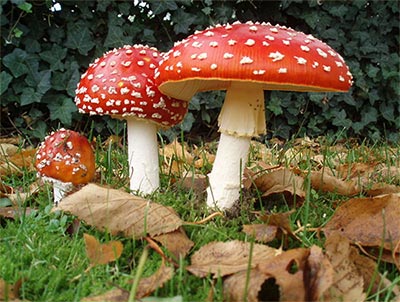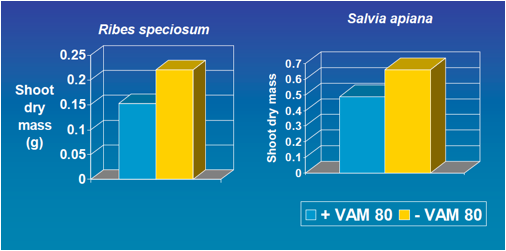
A poisonous Amanita mushroom that indicates the presence of mycorrhizal association.
Photo by: Onderwijsgek at nl.wikipedia
Some garden suppliers now offer beneficial microbial and fungal inoculants to “boost” the soil’s fertility. Some products tout the benefits of mycorrhizae inoculants for plant roots.
I contacted soil scientist Dr. Phillip J. Craul, a soil scientist and Senior Lecturer at the Graduate School of Design at Harvard University with the question: “what do the new packaged microbial and fungal products offer gardeners?” His immediate response: “I’m going to be frank, most of the time the home gardener doesn’t need to fuss with (inoculants). Such products are only helpful in special cases where you’re working with sterile material; (however), most of the biological analyses show enough organisms are usually present under artificial conditions to repopulate the soil—even in urban areas.”
In some cases, here with California native plants, inoculation with mycorrhizae had less new shoot growth—measured on a dry basis—than native soil.

“New Research in the Use of Mycorrhizaefor Nursery Production” by Lea Corkidi Mike Evans and Jeff Bohn, Tree of Life Nursery September 2008.
Furthermore, the soil’s vast complex of biota defends its own territory from “invading” microorganisms. Existing microbes and mycorrhizae can be very good at fending off inoculants. According to Martin Alexander, “Microorganisms inoculated into non-sterile soil lead to poor growth and often the seeded species is eliminated in a period of days or weeks...(due to) a rivalry for limiting nutrients, the release by one species of products toxic to its neighbor and direct feeding of one organism upon a second.”
In a study with established willow oak (Quercus phellos), red maple (Acer rubrum) and pin oak (Quercus palustris) trees it was found that “Our data indicated no apparent measurable growth benefit [to established street trees], under the terms and conditions of this research, to inoculation with a commercial mycorrhizal fungal product unless combined with fertilizer.” “Mycorrhizal fungal Inoculation of Established Street Trees” by Bonnie Appleton, Joel Koci, Susan French, Miklos Lestyan, and Roger Harris. Journal of Arboriculture 29(2): March 2003. |

